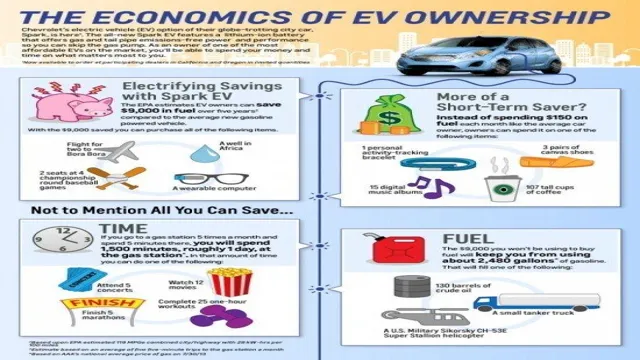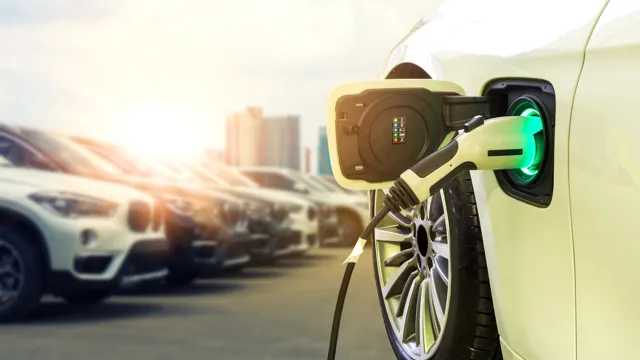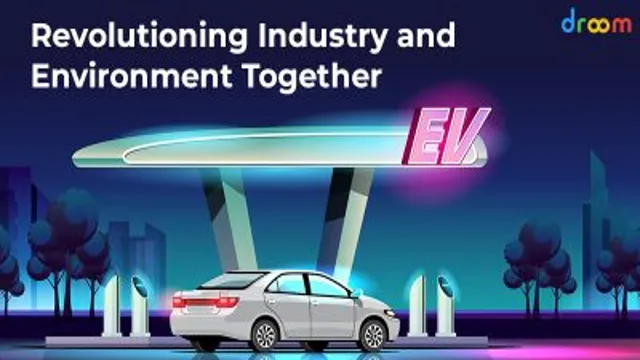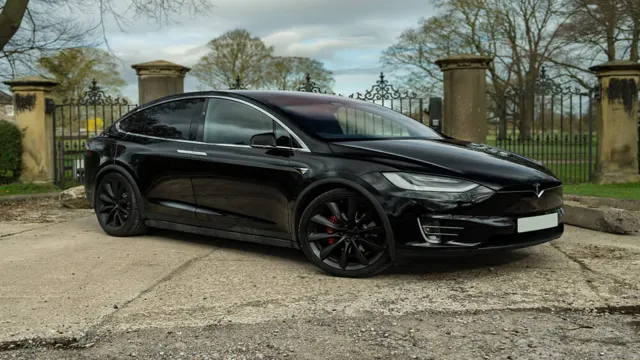10 Compelling Reasons Why Your Business Should Go Electric: The Benefits of Electric Cars You Can’t Afford to Ignore!
Electric cars have taken the automobile industry by storm in recent years and have gained immense popularity, not just among environmentalists and car enthusiasts, but also among business owners. Electric vehicles have great potential to revolutionize the transportation industry and offer numerous advantages to businesses, making them an attractive investment option for many. In this blog, we will discuss why electric cars make good business sense and the benefits they offer to businesses.
So, fasten your seatbelt and get ready to learn about the advantages of electric cars in the business world.
Environmental Benefits
One of the biggest business benefits of electric cars is their positive impact on the environment. These vehicles emit zero emissions, which means they do not contribute to air pollution, greenhouse gas emissions or climate change. This has a direct impact on the health and wellbeing of communities and ecosystems, as air and water quality improves, and wildlife and plant life thrive.
As regulations around emissions and pollution continue to tighten, companies that operate electric fleets improve their environmental profile and decrease their carbon footprint. By investing in electric cars, businesses can show a commitment to sustainability, which can generate positive brand perception and customer loyalty. Additionally, electric vehicles typically last longer and require less maintenance, saving money and resources in the long run.
Overall, the environmental benefits of electric cars make them a valuable investment for companies that want to minimize their impact on the environment and improve their social responsibility.
Reduced Carbon Footprint
Reducing our carbon footprint is of utmost importance if we want to protect our planet. One of the main environmental benefits of reducing our carbon footprint is the mitigation of climate change. By reducing greenhouse gas emissions, we can slow down the rate at which our planet is warming up.
This, in turn, helps to prevent the negative impacts of climate change such as rising sea levels and extreme weather conditions. Reduced carbon footprint also means improved air quality, as less pollution is released into the atmosphere. This can greatly benefit human health, particularly those with respiratory problems.
By making simple changes to our daily lives such as using energy-efficient appliances and using public transportation, we can all do our part in reducing our carbon footprint. Let’s take action now to protect our planet and ensure a sustainable future for generations to come.

Less Dependence on Fossil Fuels
One of the most significant environmental benefits of reducing our dependence on fossil fuels is the reduction in greenhouse gas emissions. Burning fossil fuels releases harmful pollutants into the air, which contribute to climate change and air pollution. When we transition to using renewable energy sources like wind, solar, hydropower, and geothermal energy, we can significantly reduce our carbon footprint and improve the health of our planet.
Additionally, by reducing our reliance on fossil fuels, we can protect our natural resources and reduce the harmful impact of oil spills, coal mining, and other environmentally damaging practices. By embracing sustainable energy solutions, we can create a healthier future for ourselves and generations to come. Not only that, but renewable energy sources promote the development of new technologies, creating a more innovative and sustainable economy overall.
Financial Benefits
When it comes to running a business, there are many financial benefits that come with switching to electric cars. While the initial cost may be higher than traditional gas-powered vehicles, electric cars have lower operating costs, less maintenance requirements, and potentially eligible for tax credits or incentives. This can reduce a company’s overall expenses, allowing for increased profitability in the long run.
Additionally, as more cities and countries focus on reducing greenhouse gas emissions, electric cars can help businesses meet sustainability goals, which can have a positive impact on a company’s reputation and customer loyalty. Making the switch to electric cars may be a smart financial decision for businesses looking to lower their operating costs, improve their environmental impact, and gain a competitive edge in the market.
Lower Operating Costs
Undoubtedly, one of the most significant benefits of adopting green practices is the reduction in operating costs. By opting for sustainable solutions, businesses can save a considerable amount of money on energy usage, waste disposal, and maintenance over time. For instance, energy-efficient equipment and light bulbs can reduce energy bills, while recycling and reusing waste can mitigate the costs associated with disposal.
Additionally, by reducing the waste produced and energy consumed, businesses can save money on long-term maintenance expenses and even tax rebates. Furthermore, eco-friendly practices can improve a company’s reputation, attract environmentally conscious customers, and reduce the risk of lawsuits due to environmental hazards. Overall, integrating sustainability into business practices can lead to significant financial benefits in the long run.
So, why not embrace eco-friendliness and start saving money while making a positive contribution to the planet?
Tax Credits and Incentives
Tax credits and incentives can provide businesses with significant financial benefits. These benefits can come in the form of reduced tax liabilities, cash rebates, and even financing options for specific projects. For instance, the Federal Investment Tax Credit (ITC) provides businesses that use solar energy with a tax credit worth up to 26% of the total cost of the system.
Additionally, some states offer tax incentives to businesses that are located in certain areas or that create new jobs. These incentives can include payroll tax breaks and job creation tax credits. By taking advantage of tax credits and incentives, businesses can reduce their tax bills, lower their operational costs, and improve their bottom lines.
The benefits of these programs can be significant, and businesses should investigate the various incentives available in their area to take advantage of these potential savings.
Higher Resale Value
When it comes to selling a car, everyone wants to get the most bang for their buck. That’s why investing in a higher-end car can pay off in the long run. Cars that are well-maintained and cared for will always have a higher resale value than those that are not.
In fact, some luxury vehicles can retain up to 50% of their original value after three years of ownership. The key to maximizing resale value is to keep up with routine maintenance and repairs. This will not only increase the lifespan of the vehicle but also give potential buyers confidence in their purchase.
So, if you’re looking to upgrade your ride, consider investing in a high-end car that will hold its value for years to come.
Employee Benefits
Businesses looking for employee benefits that help to reduce their carbon footprint should definitely consider electric cars. While the initial cost of purchasing an electric vehicle can be higher, the benefits are long-lasting and can save money in the long run. For one, electric cars emit zero emissions which means they contribute to cleaner air and a healthier environment.
Additionally, many states and cities offer incentives for businesses that choose to go electric, such as tax credits and rebates. And when it comes to employee perks, providing an electric vehicle charging station not only shows a commitment to sustainability, but it also allows employees to recharge their own electric cars at work, saving them time and money. Overall, investing in electric cars as a business benefit is not only good for the environment but also a smart financial decision.
Healthier Work Environment
Employee Benefits Implementing a healthier work environment can bring a multitude of benefits not only to the employees but also to the company’s overall productivity and success. One key aspect of promoting a healthier work environment is by providing Employee Benefits. These benefits can range from healthcare coverage, retirement plans, paid vacations, and sick leaves.
Providing these benefits shows that the company values its employees, reduces turnover rates, and boosts employee morale. When employees feel secure, they are more likely to be more productive, engaged, and committed to their work. As a result, the company can benefit from more significant profit margins and a better work culture.
It’s a win-win situation for both sides- employees enjoy improved quality of life, and the company benefits from a motivated workforce. In conclusion, Employee Benefits are a crucial part of promoting a healthier work environment and are worth investing in by companies who prioritize their employees’ wellbeing.
Employee Morale and Retention
Employee morale and retention can be challenging issues for businesses to tackle, but offering strong employee benefits can go a long way in improving both. Benefits like health insurance, retirement savings plans, and paid time off are crucial for creating a supportive environment that makes employees feel valued and invested in their jobs. Additionally, offering flexible scheduling or remote work options can improve work-life balance, leading to happier and more productive employees.
It’s important to regularly reassess and update benefits packages to ensure they remain competitive in the job market and meet the needs of employees. By prioritizing employee benefits, businesses can improve morale and retention, ultimately leading to a more successful and sustainable company.
Future-Proofing Your Business
Businesses that adopt electric vehicles can enjoy numerous benefits that future-proof their operations in several ways. One primary benefit of using electric cars is lower costs compared to traditional gas-fueled vehicles. Fuel and maintenance expenses are significantly lower, and electric cars have fewer moving parts that could wear and tear, which translates to reduced maintenance expenses.
Moreover, electric cars have a higher resale value, which means businesses can recoup more of their initial investment, making them an excellent long-term investment. Another advantage of going electric is the environmental impact. With the increasing awareness of climate change concerns, having an eco-friendly brand image can attract more customers and could even be a competitive advantage over other similar businesses.
As renewable energy sources such as solar and wind power continue to grow in popularity and affordability, electric cars’ use will become more sustainable and economical. Finally, electric vehicles’ inherent performance benefits, such as instant torque, quiet operation, and smooth acceleration, make them suitable for various applications, including delivery services and transport. By integrating these benefits into their operations, businesses can stand out from the crowd and future-proof their operations for the years ahead.
Conclusion
In the end, it’s clear that electric cars are not only beneficial for the environment, but also for businesses. With decreased fuel costs, reduced maintenance expenses, and positive public relations, companies who make the switch to electric will undoubtedly reap the rewards. So don’t be shocked when your competitors go electric – join the trend and charge ahead towards success!”
FAQs
What are the environmental benefits of using electric cars for businesses?
Electric cars emit zero emissions while driving, which can greatly reduce a business’s carbon footprint and contribute to a greener environment.
Are there cost savings for businesses in using electric cars?
Yes, electric cars have lower operating costs than traditional gasoline cars. They require less maintenance and have lower fuel costs, which could save businesses money in the long run.
Can businesses receive tax incentives for using electric cars?
Yes, there are federal and state tax incentives available for businesses that purchase electric cars. These incentives vary, but could potentially provide significant savings for businesses.
What are the potential downsides for businesses in using electric cars?
One downside could be limited range, as some electric cars may not be able to travel as far on a single charge as traditional cars can on a tank of gas. Additionally, upfront costs for purchasing electric cars may be higher than traditional cars.





